Applying Gibbs Model: Critical Reflection on Nursing Practice
VerifiedAdded on 2023/04/21
|11
|2844
|419
Essay
AI Summary
This essay presents a critical reflection on a nursing student's clinical placement experience, utilizing Gibbs' reflective cycle. The reflection encompasses various incidents, including caring for a stroke patient, encountering communication barriers, and facing ethical dilemmas related to patient requests. The student analyzes their feelings, evaluates the positive and negative aspects of these experiences, and discusses the importance of effective communication, teamwork, and health literacy in nursing practice. The essay also addresses the application of critical reasoning skills in resolving ethical dilemmas. The student acknowledges areas for improvement, such as communication and team-working skills, and outlines an action plan for future professional development. The goal is to enhance patient care and meet the high-quality standards set by nursing professional bodies.
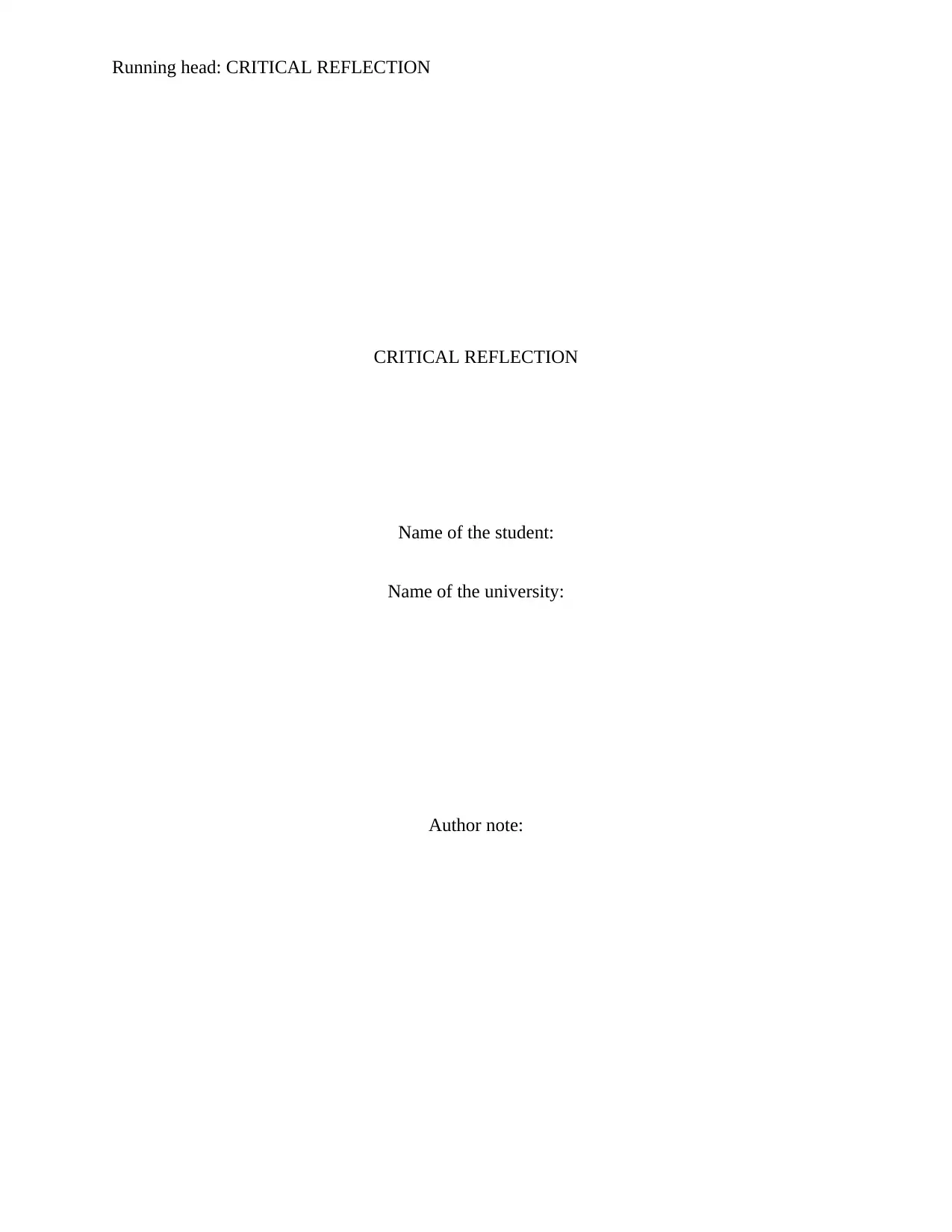
Running head: CRITICAL REFLECTION
CRITICAL REFLECTION
Name of the student:
Name of the university:
Author note:
CRITICAL REFLECTION
Name of the student:
Name of the university:
Author note:
Paraphrase This Document
Need a fresh take? Get an instant paraphrase of this document with our AI Paraphraser
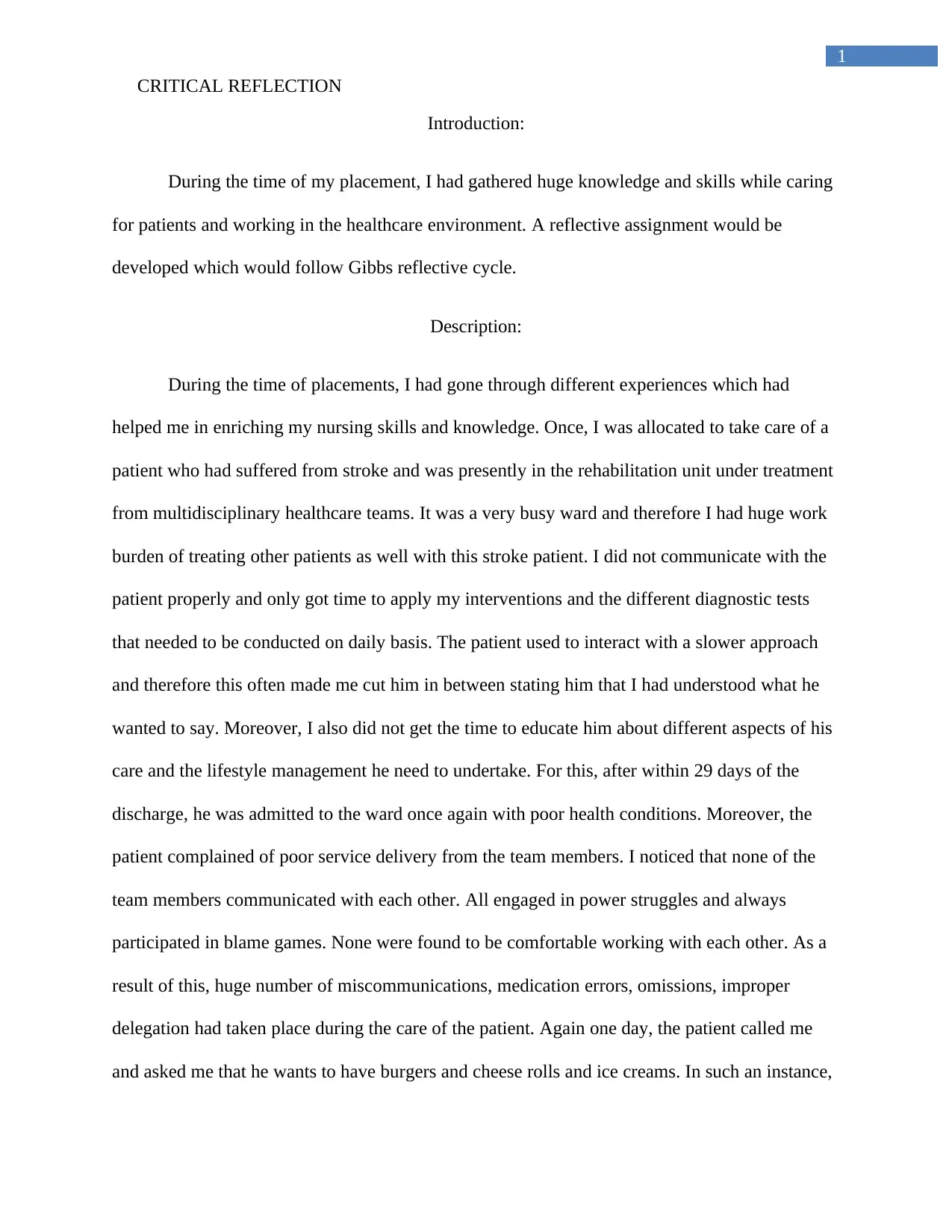
1
CRITICAL REFLECTION
Introduction:
During the time of my placement, I had gathered huge knowledge and skills while caring
for patients and working in the healthcare environment. A reflective assignment would be
developed which would follow Gibbs reflective cycle.
Description:
During the time of placements, I had gone through different experiences which had
helped me in enriching my nursing skills and knowledge. Once, I was allocated to take care of a
patient who had suffered from stroke and was presently in the rehabilitation unit under treatment
from multidisciplinary healthcare teams. It was a very busy ward and therefore I had huge work
burden of treating other patients as well with this stroke patient. I did not communicate with the
patient properly and only got time to apply my interventions and the different diagnostic tests
that needed to be conducted on daily basis. The patient used to interact with a slower approach
and therefore this often made me cut him in between stating him that I had understood what he
wanted to say. Moreover, I also did not get the time to educate him about different aspects of his
care and the lifestyle management he need to undertake. For this, after within 29 days of the
discharge, he was admitted to the ward once again with poor health conditions. Moreover, the
patient complained of poor service delivery from the team members. I noticed that none of the
team members communicated with each other. All engaged in power struggles and always
participated in blame games. None were found to be comfortable working with each other. As a
result of this, huge number of miscommunications, medication errors, omissions, improper
delegation had taken place during the care of the patient. Again one day, the patient called me
and asked me that he wants to have burgers and cheese rolls and ice creams. In such an instance,
CRITICAL REFLECTION
Introduction:
During the time of my placement, I had gathered huge knowledge and skills while caring
for patients and working in the healthcare environment. A reflective assignment would be
developed which would follow Gibbs reflective cycle.
Description:
During the time of placements, I had gone through different experiences which had
helped me in enriching my nursing skills and knowledge. Once, I was allocated to take care of a
patient who had suffered from stroke and was presently in the rehabilitation unit under treatment
from multidisciplinary healthcare teams. It was a very busy ward and therefore I had huge work
burden of treating other patients as well with this stroke patient. I did not communicate with the
patient properly and only got time to apply my interventions and the different diagnostic tests
that needed to be conducted on daily basis. The patient used to interact with a slower approach
and therefore this often made me cut him in between stating him that I had understood what he
wanted to say. Moreover, I also did not get the time to educate him about different aspects of his
care and the lifestyle management he need to undertake. For this, after within 29 days of the
discharge, he was admitted to the ward once again with poor health conditions. Moreover, the
patient complained of poor service delivery from the team members. I noticed that none of the
team members communicated with each other. All engaged in power struggles and always
participated in blame games. None were found to be comfortable working with each other. As a
result of this, huge number of miscommunications, medication errors, omissions, improper
delegation had taken place during the care of the patient. Again one day, the patient called me
and asked me that he wants to have burgers and cheese rolls and ice creams. In such an instance,
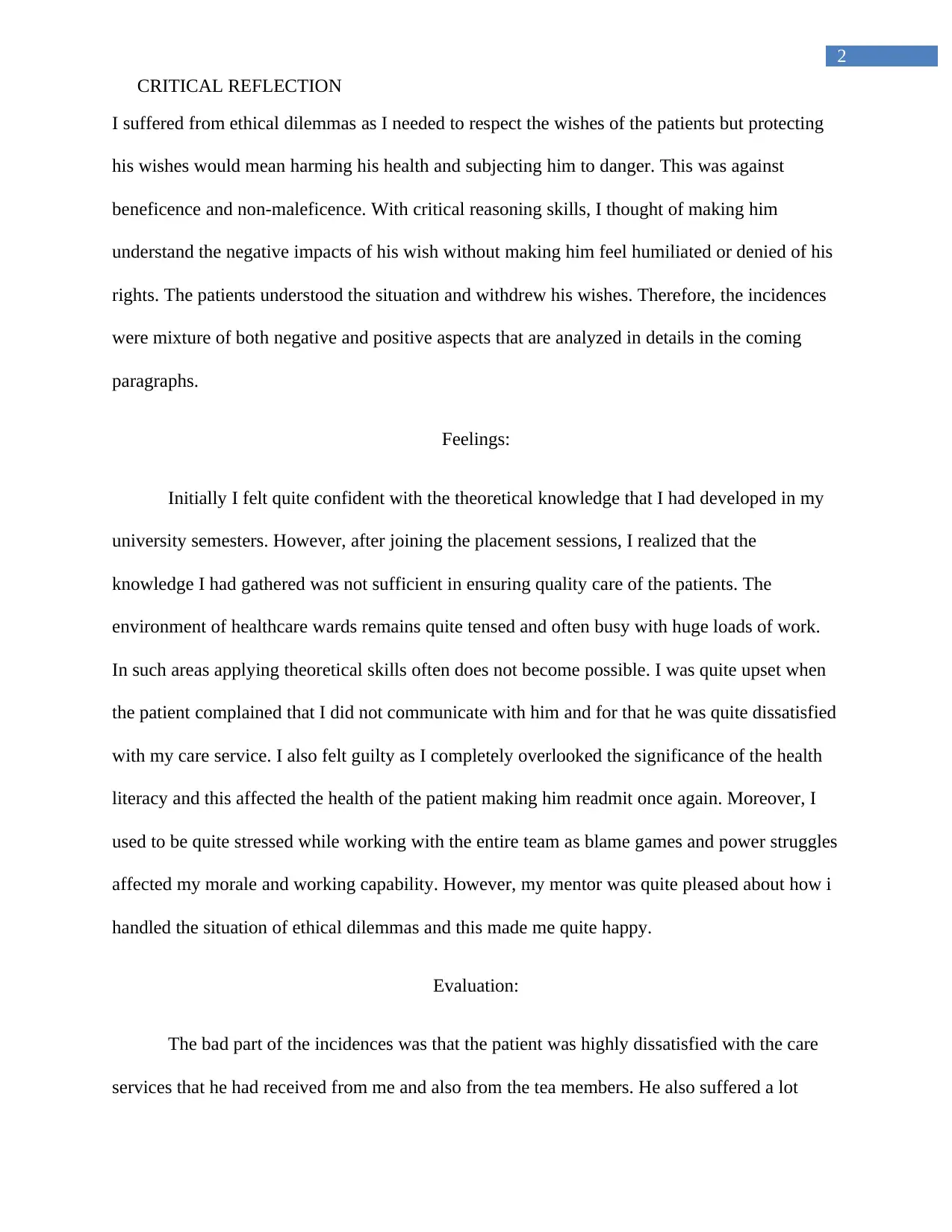
2
CRITICAL REFLECTION
I suffered from ethical dilemmas as I needed to respect the wishes of the patients but protecting
his wishes would mean harming his health and subjecting him to danger. This was against
beneficence and non-maleficence. With critical reasoning skills, I thought of making him
understand the negative impacts of his wish without making him feel humiliated or denied of his
rights. The patients understood the situation and withdrew his wishes. Therefore, the incidences
were mixture of both negative and positive aspects that are analyzed in details in the coming
paragraphs.
Feelings:
Initially I felt quite confident with the theoretical knowledge that I had developed in my
university semesters. However, after joining the placement sessions, I realized that the
knowledge I had gathered was not sufficient in ensuring quality care of the patients. The
environment of healthcare wards remains quite tensed and often busy with huge loads of work.
In such areas applying theoretical skills often does not become possible. I was quite upset when
the patient complained that I did not communicate with him and for that he was quite dissatisfied
with my care service. I also felt guilty as I completely overlooked the significance of the health
literacy and this affected the health of the patient making him readmit once again. Moreover, I
used to be quite stressed while working with the entire team as blame games and power struggles
affected my morale and working capability. However, my mentor was quite pleased about how i
handled the situation of ethical dilemmas and this made me quite happy.
Evaluation:
The bad part of the incidences was that the patient was highly dissatisfied with the care
services that he had received from me and also from the tea members. He also suffered a lot
CRITICAL REFLECTION
I suffered from ethical dilemmas as I needed to respect the wishes of the patients but protecting
his wishes would mean harming his health and subjecting him to danger. This was against
beneficence and non-maleficence. With critical reasoning skills, I thought of making him
understand the negative impacts of his wish without making him feel humiliated or denied of his
rights. The patients understood the situation and withdrew his wishes. Therefore, the incidences
were mixture of both negative and positive aspects that are analyzed in details in the coming
paragraphs.
Feelings:
Initially I felt quite confident with the theoretical knowledge that I had developed in my
university semesters. However, after joining the placement sessions, I realized that the
knowledge I had gathered was not sufficient in ensuring quality care of the patients. The
environment of healthcare wards remains quite tensed and often busy with huge loads of work.
In such areas applying theoretical skills often does not become possible. I was quite upset when
the patient complained that I did not communicate with him and for that he was quite dissatisfied
with my care service. I also felt guilty as I completely overlooked the significance of the health
literacy and this affected the health of the patient making him readmit once again. Moreover, I
used to be quite stressed while working with the entire team as blame games and power struggles
affected my morale and working capability. However, my mentor was quite pleased about how i
handled the situation of ethical dilemmas and this made me quite happy.
Evaluation:
The bad part of the incidences was that the patient was highly dissatisfied with the care
services that he had received from me and also from the tea members. He also suffered a lot
⊘ This is a preview!⊘
Do you want full access?
Subscribe today to unlock all pages.

Trusted by 1+ million students worldwide
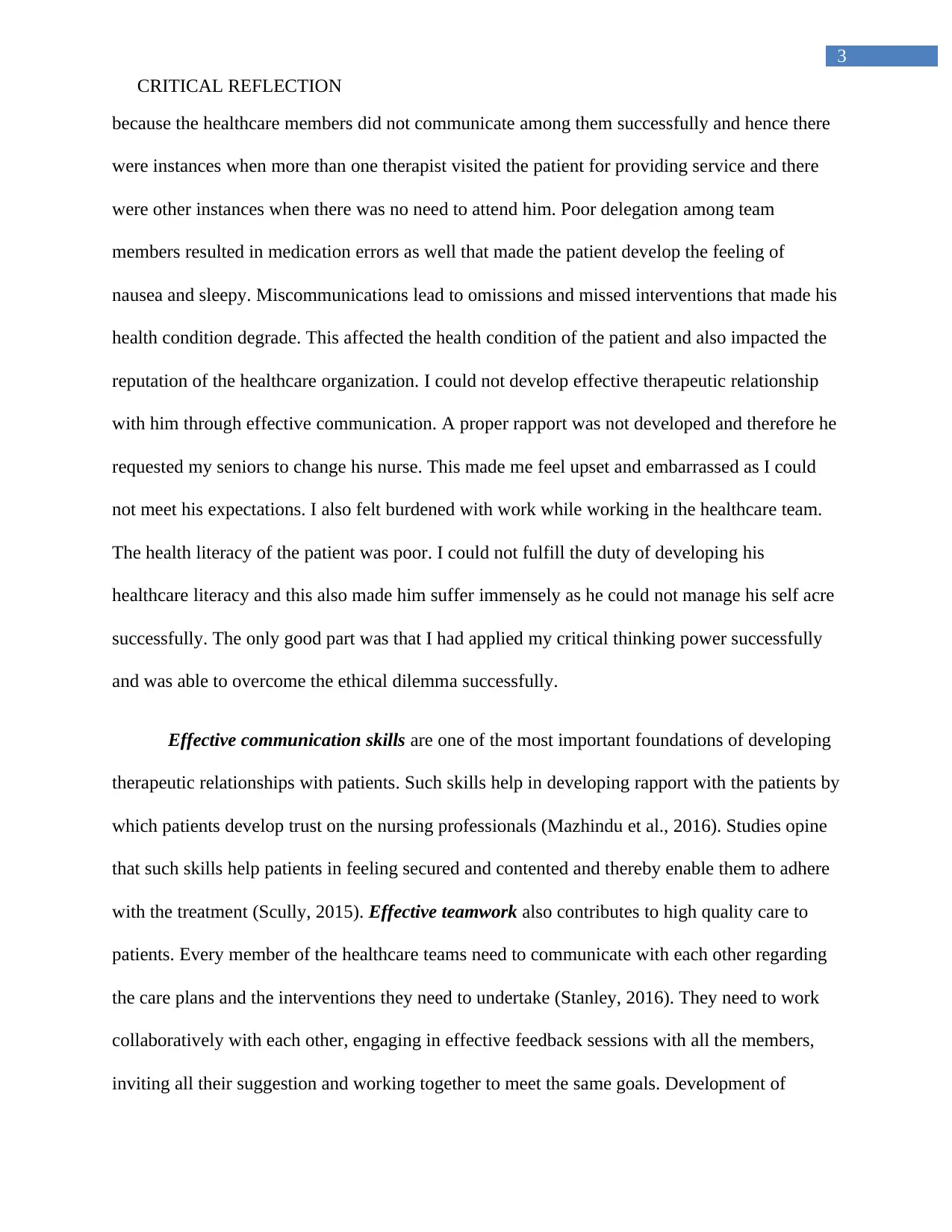
3
CRITICAL REFLECTION
because the healthcare members did not communicate among them successfully and hence there
were instances when more than one therapist visited the patient for providing service and there
were other instances when there was no need to attend him. Poor delegation among team
members resulted in medication errors as well that made the patient develop the feeling of
nausea and sleepy. Miscommunications lead to omissions and missed interventions that made his
health condition degrade. This affected the health condition of the patient and also impacted the
reputation of the healthcare organization. I could not develop effective therapeutic relationship
with him through effective communication. A proper rapport was not developed and therefore he
requested my seniors to change his nurse. This made me feel upset and embarrassed as I could
not meet his expectations. I also felt burdened with work while working in the healthcare team.
The health literacy of the patient was poor. I could not fulfill the duty of developing his
healthcare literacy and this also made him suffer immensely as he could not manage his self acre
successfully. The only good part was that I had applied my critical thinking power successfully
and was able to overcome the ethical dilemma successfully.
Effective communication skills are one of the most important foundations of developing
therapeutic relationships with patients. Such skills help in developing rapport with the patients by
which patients develop trust on the nursing professionals (Mazhindu et al., 2016). Studies opine
that such skills help patients in feeling secured and contented and thereby enable them to adhere
with the treatment (Scully, 2015). Effective teamwork also contributes to high quality care to
patients. Every member of the healthcare teams need to communicate with each other regarding
the care plans and the interventions they need to undertake (Stanley, 2016). They need to work
collaboratively with each other, engaging in effective feedback sessions with all the members,
inviting all their suggestion and working together to meet the same goals. Development of
CRITICAL REFLECTION
because the healthcare members did not communicate among them successfully and hence there
were instances when more than one therapist visited the patient for providing service and there
were other instances when there was no need to attend him. Poor delegation among team
members resulted in medication errors as well that made the patient develop the feeling of
nausea and sleepy. Miscommunications lead to omissions and missed interventions that made his
health condition degrade. This affected the health condition of the patient and also impacted the
reputation of the healthcare organization. I could not develop effective therapeutic relationship
with him through effective communication. A proper rapport was not developed and therefore he
requested my seniors to change his nurse. This made me feel upset and embarrassed as I could
not meet his expectations. I also felt burdened with work while working in the healthcare team.
The health literacy of the patient was poor. I could not fulfill the duty of developing his
healthcare literacy and this also made him suffer immensely as he could not manage his self acre
successfully. The only good part was that I had applied my critical thinking power successfully
and was able to overcome the ethical dilemma successfully.
Effective communication skills are one of the most important foundations of developing
therapeutic relationships with patients. Such skills help in developing rapport with the patients by
which patients develop trust on the nursing professionals (Mazhindu et al., 2016). Studies opine
that such skills help patients in feeling secured and contented and thereby enable them to adhere
with the treatment (Scully, 2015). Effective teamwork also contributes to high quality care to
patients. Every member of the healthcare teams need to communicate with each other regarding
the care plans and the interventions they need to undertake (Stanley, 2016). They need to work
collaboratively with each other, engaging in effective feedback sessions with all the members,
inviting all their suggestion and working together to meet the same goals. Development of
Paraphrase This Document
Need a fresh take? Get an instant paraphrase of this document with our AI Paraphraser
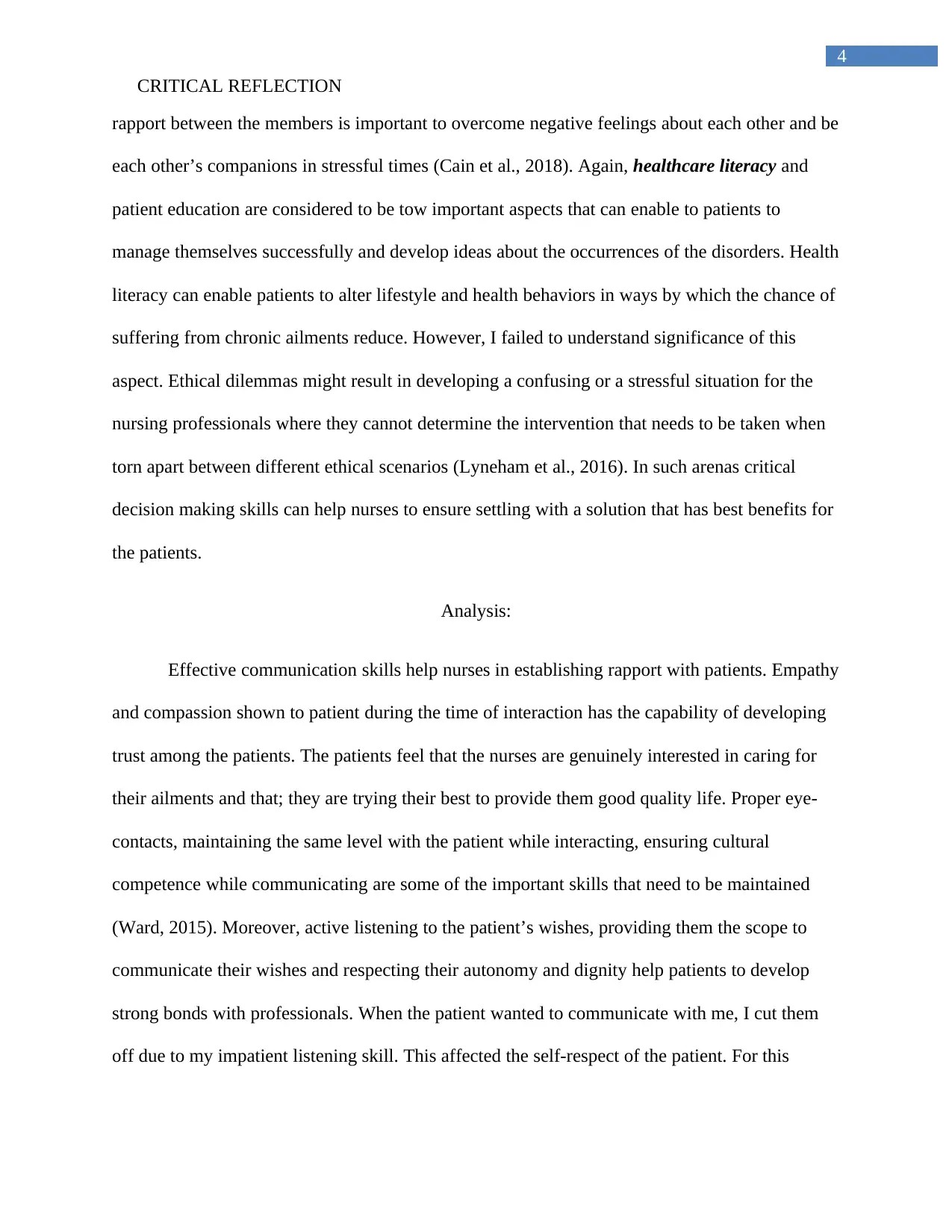
4
CRITICAL REFLECTION
rapport between the members is important to overcome negative feelings about each other and be
each other’s companions in stressful times (Cain et al., 2018). Again, healthcare literacy and
patient education are considered to be tow important aspects that can enable to patients to
manage themselves successfully and develop ideas about the occurrences of the disorders. Health
literacy can enable patients to alter lifestyle and health behaviors in ways by which the chance of
suffering from chronic ailments reduce. However, I failed to understand significance of this
aspect. Ethical dilemmas might result in developing a confusing or a stressful situation for the
nursing professionals where they cannot determine the intervention that needs to be taken when
torn apart between different ethical scenarios (Lyneham et al., 2016). In such arenas critical
decision making skills can help nurses to ensure settling with a solution that has best benefits for
the patients.
Analysis:
Effective communication skills help nurses in establishing rapport with patients. Empathy
and compassion shown to patient during the time of interaction has the capability of developing
trust among the patients. The patients feel that the nurses are genuinely interested in caring for
their ailments and that; they are trying their best to provide them good quality life. Proper eye-
contacts, maintaining the same level with the patient while interacting, ensuring cultural
competence while communicating are some of the important skills that need to be maintained
(Ward, 2015). Moreover, active listening to the patient’s wishes, providing them the scope to
communicate their wishes and respecting their autonomy and dignity help patients to develop
strong bonds with professionals. When the patient wanted to communicate with me, I cut them
off due to my impatient listening skill. This affected the self-respect of the patient. For this
CRITICAL REFLECTION
rapport between the members is important to overcome negative feelings about each other and be
each other’s companions in stressful times (Cain et al., 2018). Again, healthcare literacy and
patient education are considered to be tow important aspects that can enable to patients to
manage themselves successfully and develop ideas about the occurrences of the disorders. Health
literacy can enable patients to alter lifestyle and health behaviors in ways by which the chance of
suffering from chronic ailments reduce. However, I failed to understand significance of this
aspect. Ethical dilemmas might result in developing a confusing or a stressful situation for the
nursing professionals where they cannot determine the intervention that needs to be taken when
torn apart between different ethical scenarios (Lyneham et al., 2016). In such arenas critical
decision making skills can help nurses to ensure settling with a solution that has best benefits for
the patients.
Analysis:
Effective communication skills help nurses in establishing rapport with patients. Empathy
and compassion shown to patient during the time of interaction has the capability of developing
trust among the patients. The patients feel that the nurses are genuinely interested in caring for
their ailments and that; they are trying their best to provide them good quality life. Proper eye-
contacts, maintaining the same level with the patient while interacting, ensuring cultural
competence while communicating are some of the important skills that need to be maintained
(Ward, 2015). Moreover, active listening to the patient’s wishes, providing them the scope to
communicate their wishes and respecting their autonomy and dignity help patients to develop
strong bonds with professionals. When the patient wanted to communicate with me, I cut them
off due to my impatient listening skill. This affected the self-respect of the patient. For this
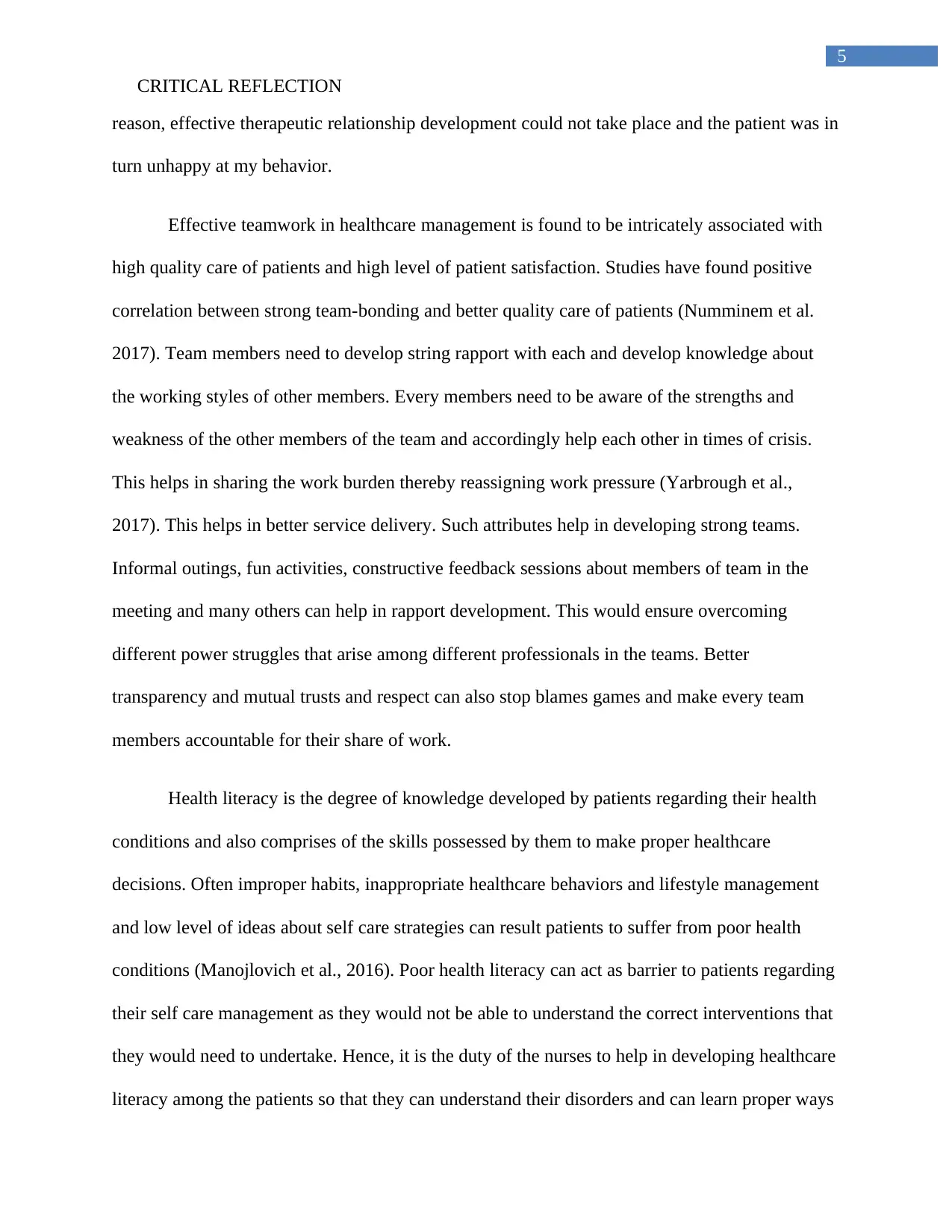
5
CRITICAL REFLECTION
reason, effective therapeutic relationship development could not take place and the patient was in
turn unhappy at my behavior.
Effective teamwork in healthcare management is found to be intricately associated with
high quality care of patients and high level of patient satisfaction. Studies have found positive
correlation between strong team-bonding and better quality care of patients (Numminem et al.
2017). Team members need to develop string rapport with each and develop knowledge about
the working styles of other members. Every members need to be aware of the strengths and
weakness of the other members of the team and accordingly help each other in times of crisis.
This helps in sharing the work burden thereby reassigning work pressure (Yarbrough et al.,
2017). This helps in better service delivery. Such attributes help in developing strong teams.
Informal outings, fun activities, constructive feedback sessions about members of team in the
meeting and many others can help in rapport development. This would ensure overcoming
different power struggles that arise among different professionals in the teams. Better
transparency and mutual trusts and respect can also stop blames games and make every team
members accountable for their share of work.
Health literacy is the degree of knowledge developed by patients regarding their health
conditions and also comprises of the skills possessed by them to make proper healthcare
decisions. Often improper habits, inappropriate healthcare behaviors and lifestyle management
and low level of ideas about self care strategies can result patients to suffer from poor health
conditions (Manojlovich et al., 2016). Poor health literacy can act as barrier to patients regarding
their self care management as they would not be able to understand the correct interventions that
they would need to undertake. Hence, it is the duty of the nurses to help in developing healthcare
literacy among the patients so that they can understand their disorders and can learn proper ways
CRITICAL REFLECTION
reason, effective therapeutic relationship development could not take place and the patient was in
turn unhappy at my behavior.
Effective teamwork in healthcare management is found to be intricately associated with
high quality care of patients and high level of patient satisfaction. Studies have found positive
correlation between strong team-bonding and better quality care of patients (Numminem et al.
2017). Team members need to develop string rapport with each and develop knowledge about
the working styles of other members. Every members need to be aware of the strengths and
weakness of the other members of the team and accordingly help each other in times of crisis.
This helps in sharing the work burden thereby reassigning work pressure (Yarbrough et al.,
2017). This helps in better service delivery. Such attributes help in developing strong teams.
Informal outings, fun activities, constructive feedback sessions about members of team in the
meeting and many others can help in rapport development. This would ensure overcoming
different power struggles that arise among different professionals in the teams. Better
transparency and mutual trusts and respect can also stop blames games and make every team
members accountable for their share of work.
Health literacy is the degree of knowledge developed by patients regarding their health
conditions and also comprises of the skills possessed by them to make proper healthcare
decisions. Often improper habits, inappropriate healthcare behaviors and lifestyle management
and low level of ideas about self care strategies can result patients to suffer from poor health
conditions (Manojlovich et al., 2016). Poor health literacy can act as barrier to patients regarding
their self care management as they would not be able to understand the correct interventions that
they would need to undertake. Hence, it is the duty of the nurses to help in developing healthcare
literacy among the patients so that they can understand their disorders and can learn proper ways
⊘ This is a preview!⊘
Do you want full access?
Subscribe today to unlock all pages.

Trusted by 1+ million students worldwide
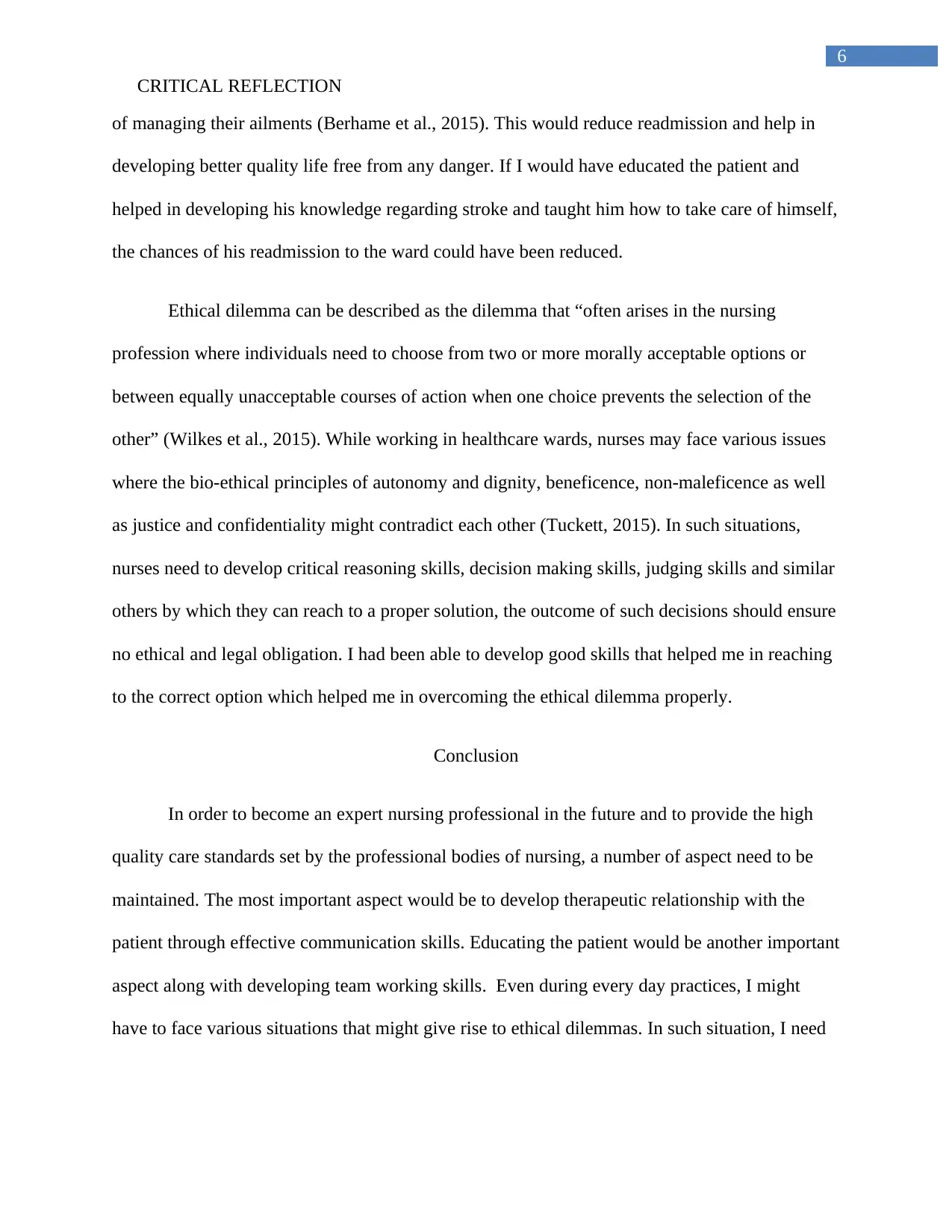
6
CRITICAL REFLECTION
of managing their ailments (Berhame et al., 2015). This would reduce readmission and help in
developing better quality life free from any danger. If I would have educated the patient and
helped in developing his knowledge regarding stroke and taught him how to take care of himself,
the chances of his readmission to the ward could have been reduced.
Ethical dilemma can be described as the dilemma that “often arises in the nursing
profession where individuals need to choose from two or more morally acceptable options or
between equally unacceptable courses of action when one choice prevents the selection of the
other” (Wilkes et al., 2015). While working in healthcare wards, nurses may face various issues
where the bio-ethical principles of autonomy and dignity, beneficence, non-maleficence as well
as justice and confidentiality might contradict each other (Tuckett, 2015). In such situations,
nurses need to develop critical reasoning skills, decision making skills, judging skills and similar
others by which they can reach to a proper solution, the outcome of such decisions should ensure
no ethical and legal obligation. I had been able to develop good skills that helped me in reaching
to the correct option which helped me in overcoming the ethical dilemma properly.
Conclusion
In order to become an expert nursing professional in the future and to provide the high
quality care standards set by the professional bodies of nursing, a number of aspect need to be
maintained. The most important aspect would be to develop therapeutic relationship with the
patient through effective communication skills. Educating the patient would be another important
aspect along with developing team working skills. Even during every day practices, I might
have to face various situations that might give rise to ethical dilemmas. In such situation, I need
CRITICAL REFLECTION
of managing their ailments (Berhame et al., 2015). This would reduce readmission and help in
developing better quality life free from any danger. If I would have educated the patient and
helped in developing his knowledge regarding stroke and taught him how to take care of himself,
the chances of his readmission to the ward could have been reduced.
Ethical dilemma can be described as the dilemma that “often arises in the nursing
profession where individuals need to choose from two or more morally acceptable options or
between equally unacceptable courses of action when one choice prevents the selection of the
other” (Wilkes et al., 2015). While working in healthcare wards, nurses may face various issues
where the bio-ethical principles of autonomy and dignity, beneficence, non-maleficence as well
as justice and confidentiality might contradict each other (Tuckett, 2015). In such situations,
nurses need to develop critical reasoning skills, decision making skills, judging skills and similar
others by which they can reach to a proper solution, the outcome of such decisions should ensure
no ethical and legal obligation. I had been able to develop good skills that helped me in reaching
to the correct option which helped me in overcoming the ethical dilemma properly.
Conclusion
In order to become an expert nursing professional in the future and to provide the high
quality care standards set by the professional bodies of nursing, a number of aspect need to be
maintained. The most important aspect would be to develop therapeutic relationship with the
patient through effective communication skills. Educating the patient would be another important
aspect along with developing team working skills. Even during every day practices, I might
have to face various situations that might give rise to ethical dilemmas. In such situation, I need
Paraphrase This Document
Need a fresh take? Get an instant paraphrase of this document with our AI Paraphraser
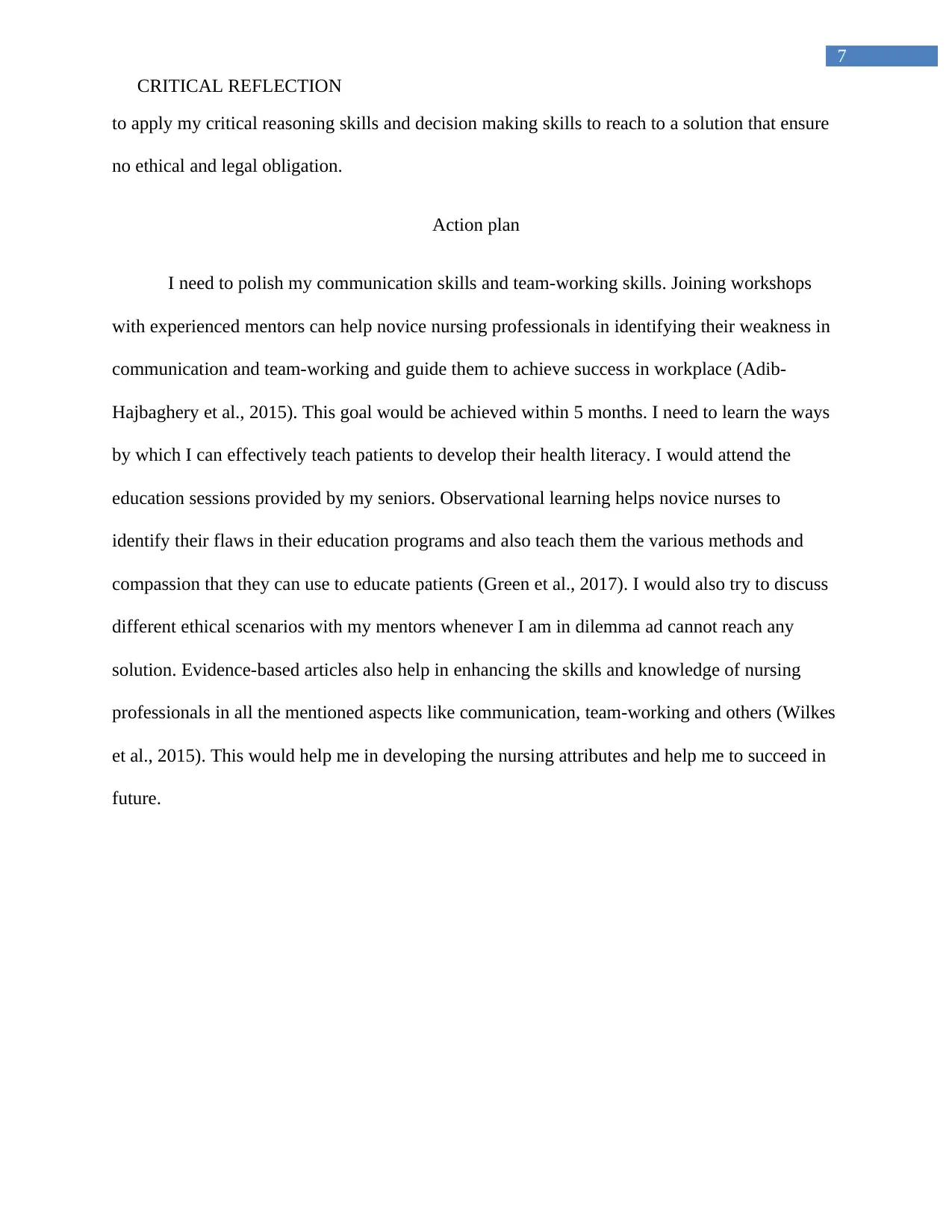
7
CRITICAL REFLECTION
to apply my critical reasoning skills and decision making skills to reach to a solution that ensure
no ethical and legal obligation.
Action plan
I need to polish my communication skills and team-working skills. Joining workshops
with experienced mentors can help novice nursing professionals in identifying their weakness in
communication and team-working and guide them to achieve success in workplace (Adib-
Hajbaghery et al., 2015). This goal would be achieved within 5 months. I need to learn the ways
by which I can effectively teach patients to develop their health literacy. I would attend the
education sessions provided by my seniors. Observational learning helps novice nurses to
identify their flaws in their education programs and also teach them the various methods and
compassion that they can use to educate patients (Green et al., 2017). I would also try to discuss
different ethical scenarios with my mentors whenever I am in dilemma ad cannot reach any
solution. Evidence-based articles also help in enhancing the skills and knowledge of nursing
professionals in all the mentioned aspects like communication, team-working and others (Wilkes
et al., 2015). This would help me in developing the nursing attributes and help me to succeed in
future.
CRITICAL REFLECTION
to apply my critical reasoning skills and decision making skills to reach to a solution that ensure
no ethical and legal obligation.
Action plan
I need to polish my communication skills and team-working skills. Joining workshops
with experienced mentors can help novice nursing professionals in identifying their weakness in
communication and team-working and guide them to achieve success in workplace (Adib-
Hajbaghery et al., 2015). This goal would be achieved within 5 months. I need to learn the ways
by which I can effectively teach patients to develop their health literacy. I would attend the
education sessions provided by my seniors. Observational learning helps novice nurses to
identify their flaws in their education programs and also teach them the various methods and
compassion that they can use to educate patients (Green et al., 2017). I would also try to discuss
different ethical scenarios with my mentors whenever I am in dilemma ad cannot reach any
solution. Evidence-based articles also help in enhancing the skills and knowledge of nursing
professionals in all the mentioned aspects like communication, team-working and others (Wilkes
et al., 2015). This would help me in developing the nursing attributes and help me to succeed in
future.
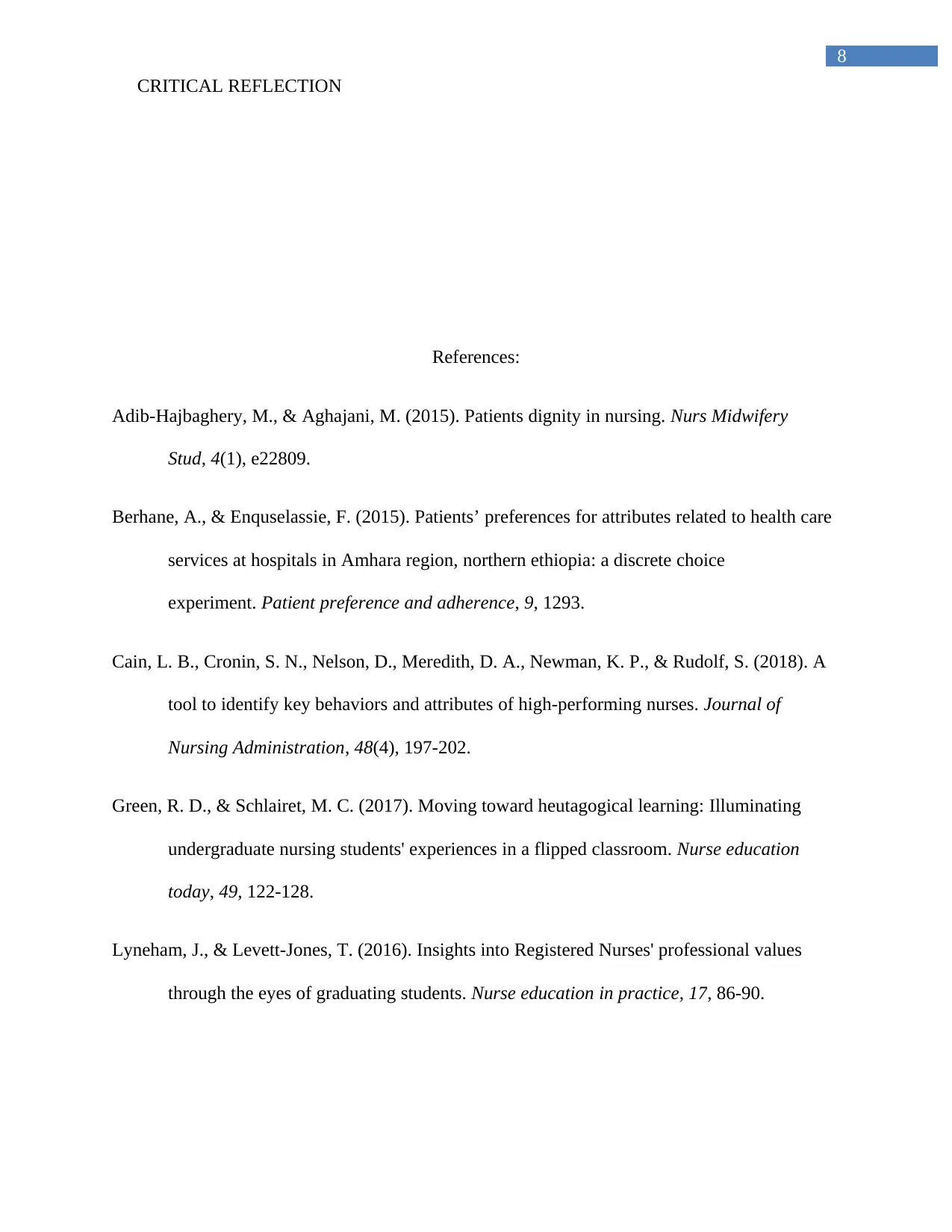
8
CRITICAL REFLECTION
References:
Adib-Hajbaghery, M., & Aghajani, M. (2015). Patients dignity in nursing. Nurs Midwifery
Stud, 4(1), e22809.
Berhane, A., & Enquselassie, F. (2015). Patients’ preferences for attributes related to health care
services at hospitals in Amhara region, northern ethiopia: a discrete choice
experiment. Patient preference and adherence, 9, 1293.
Cain, L. B., Cronin, S. N., Nelson, D., Meredith, D. A., Newman, K. P., & Rudolf, S. (2018). A
tool to identify key behaviors and attributes of high-performing nurses. Journal of
Nursing Administration, 48(4), 197-202.
Green, R. D., & Schlairet, M. C. (2017). Moving toward heutagogical learning: Illuminating
undergraduate nursing students' experiences in a flipped classroom. Nurse education
today, 49, 122-128.
Lyneham, J., & Levett-Jones, T. (2016). Insights into Registered Nurses' professional values
through the eyes of graduating students. Nurse education in practice, 17, 86-90.
CRITICAL REFLECTION
References:
Adib-Hajbaghery, M., & Aghajani, M. (2015). Patients dignity in nursing. Nurs Midwifery
Stud, 4(1), e22809.
Berhane, A., & Enquselassie, F. (2015). Patients’ preferences for attributes related to health care
services at hospitals in Amhara region, northern ethiopia: a discrete choice
experiment. Patient preference and adherence, 9, 1293.
Cain, L. B., Cronin, S. N., Nelson, D., Meredith, D. A., Newman, K. P., & Rudolf, S. (2018). A
tool to identify key behaviors and attributes of high-performing nurses. Journal of
Nursing Administration, 48(4), 197-202.
Green, R. D., & Schlairet, M. C. (2017). Moving toward heutagogical learning: Illuminating
undergraduate nursing students' experiences in a flipped classroom. Nurse education
today, 49, 122-128.
Lyneham, J., & Levett-Jones, T. (2016). Insights into Registered Nurses' professional values
through the eyes of graduating students. Nurse education in practice, 17, 86-90.
⊘ This is a preview!⊘
Do you want full access?
Subscribe today to unlock all pages.

Trusted by 1+ million students worldwide
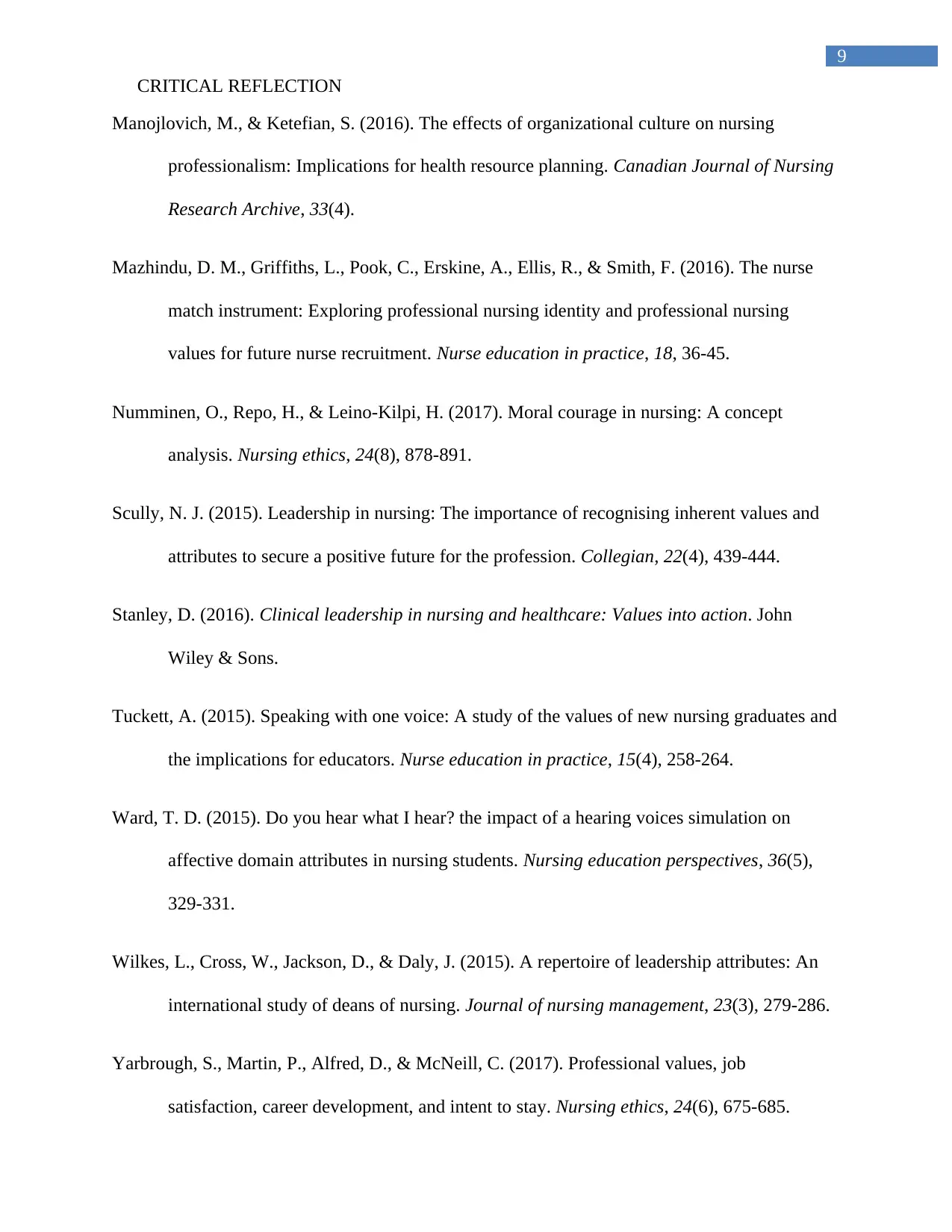
9
CRITICAL REFLECTION
Manojlovich, M., & Ketefian, S. (2016). The effects of organizational culture on nursing
professionalism: Implications for health resource planning. Canadian Journal of Nursing
Research Archive, 33(4).
Mazhindu, D. M., Griffiths, L., Pook, C., Erskine, A., Ellis, R., & Smith, F. (2016). The nurse
match instrument: Exploring professional nursing identity and professional nursing
values for future nurse recruitment. Nurse education in practice, 18, 36-45.
Numminen, O., Repo, H., & Leino-Kilpi, H. (2017). Moral courage in nursing: A concept
analysis. Nursing ethics, 24(8), 878-891.
Scully, N. J. (2015). Leadership in nursing: The importance of recognising inherent values and
attributes to secure a positive future for the profession. Collegian, 22(4), 439-444.
Stanley, D. (2016). Clinical leadership in nursing and healthcare: Values into action. John
Wiley & Sons.
Tuckett, A. (2015). Speaking with one voice: A study of the values of new nursing graduates and
the implications for educators. Nurse education in practice, 15(4), 258-264.
Ward, T. D. (2015). Do you hear what I hear? the impact of a hearing voices simulation on
affective domain attributes in nursing students. Nursing education perspectives, 36(5),
329-331.
Wilkes, L., Cross, W., Jackson, D., & Daly, J. (2015). A repertoire of leadership attributes: An
international study of deans of nursing. Journal of nursing management, 23(3), 279-286.
Yarbrough, S., Martin, P., Alfred, D., & McNeill, C. (2017). Professional values, job
satisfaction, career development, and intent to stay. Nursing ethics, 24(6), 675-685.
CRITICAL REFLECTION
Manojlovich, M., & Ketefian, S. (2016). The effects of organizational culture on nursing
professionalism: Implications for health resource planning. Canadian Journal of Nursing
Research Archive, 33(4).
Mazhindu, D. M., Griffiths, L., Pook, C., Erskine, A., Ellis, R., & Smith, F. (2016). The nurse
match instrument: Exploring professional nursing identity and professional nursing
values for future nurse recruitment. Nurse education in practice, 18, 36-45.
Numminen, O., Repo, H., & Leino-Kilpi, H. (2017). Moral courage in nursing: A concept
analysis. Nursing ethics, 24(8), 878-891.
Scully, N. J. (2015). Leadership in nursing: The importance of recognising inherent values and
attributes to secure a positive future for the profession. Collegian, 22(4), 439-444.
Stanley, D. (2016). Clinical leadership in nursing and healthcare: Values into action. John
Wiley & Sons.
Tuckett, A. (2015). Speaking with one voice: A study of the values of new nursing graduates and
the implications for educators. Nurse education in practice, 15(4), 258-264.
Ward, T. D. (2015). Do you hear what I hear? the impact of a hearing voices simulation on
affective domain attributes in nursing students. Nursing education perspectives, 36(5),
329-331.
Wilkes, L., Cross, W., Jackson, D., & Daly, J. (2015). A repertoire of leadership attributes: An
international study of deans of nursing. Journal of nursing management, 23(3), 279-286.
Yarbrough, S., Martin, P., Alfred, D., & McNeill, C. (2017). Professional values, job
satisfaction, career development, and intent to stay. Nursing ethics, 24(6), 675-685.
Paraphrase This Document
Need a fresh take? Get an instant paraphrase of this document with our AI Paraphraser
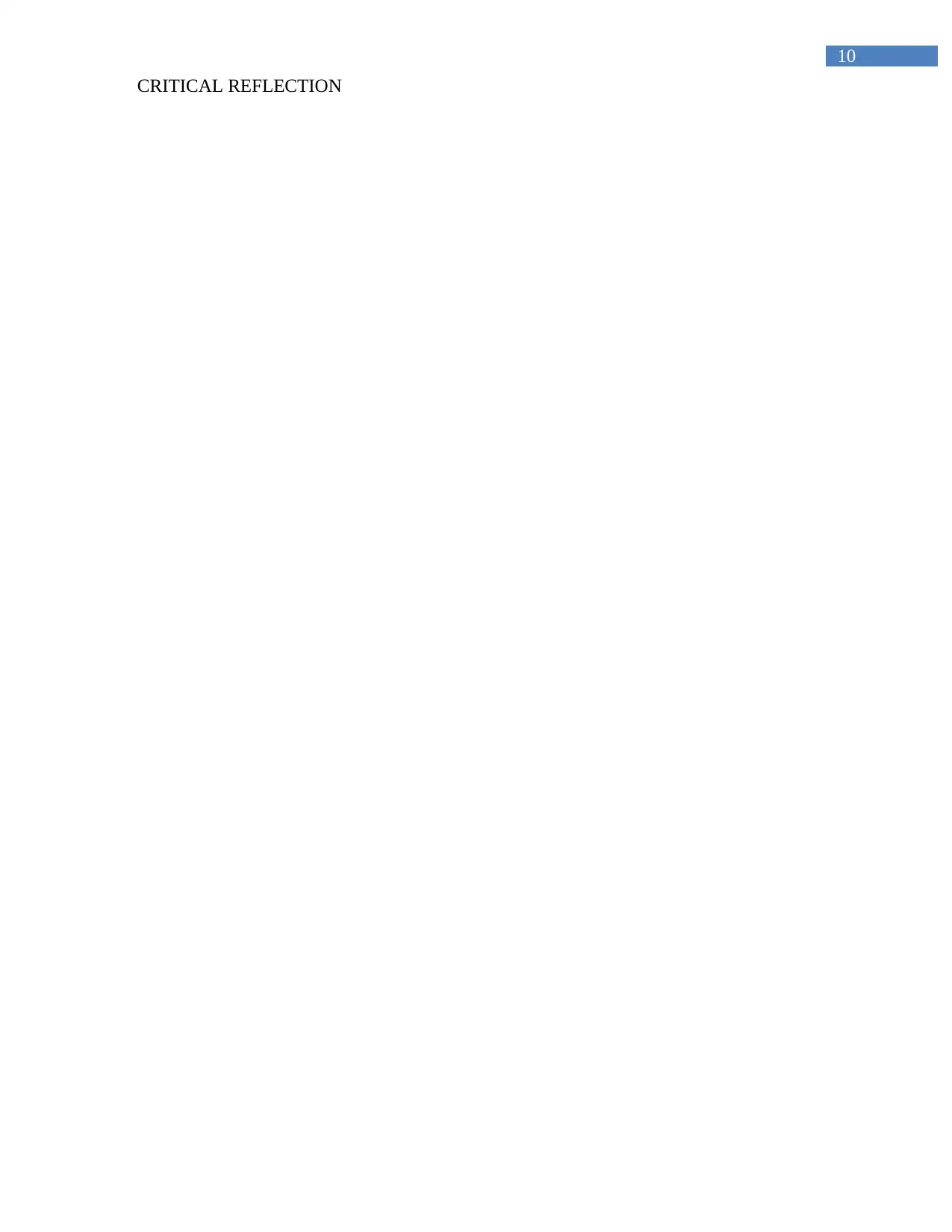
10
CRITICAL REFLECTION
CRITICAL REFLECTION
1 out of 11
Related Documents
Your All-in-One AI-Powered Toolkit for Academic Success.
+13062052269
info@desklib.com
Available 24*7 on WhatsApp / Email
![[object Object]](/_next/static/media/star-bottom.7253800d.svg)
Unlock your academic potential
Copyright © 2020–2026 A2Z Services. All Rights Reserved. Developed and managed by ZUCOL.





